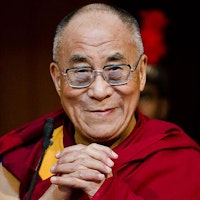Paradoxically, it is only when one has a deep experience rooted in one’s own faith tradition that one is able to appreciate the value of other religions.
Paradoxically, it is only when one has a deep experience rooted in one’s own faith tradition that one is able to appreciate the value of other religions.
The Dalai Lama

A Deep Experience
Theme: Interfaith Dialogue
When genuine practitioners from two different traditions meet, they are able to recognize the qualities present in each other as the very same qualities that they seek to cultivate in their own faith traditions, in the fashion of seeing one’s own face in a mirror. Paradoxically, it is only when one has a deep experience rooted in one’s own faith tradition that one is able to appreciate the value of other religions. For without some experience grounded in one’s own faith, one simply does not have a point of reference with which to relate to another’s deep religious realization.
Tenzin Gyatso, born on July 6, 1935, is known globally as the 14th Dalai Lama, the spiritual and former political leader of the Tibetan people. Born as Lhamo Thondup in a farming family in Taktser, Amdo, Tibet, he was recognized as the reincarnation of the 13th Dalai Lama, Thubten Gyatso, when he was just two years old. As the Dalai Lama, he holds the highest spiritual position within Tibetan Buddhism and is seen as a figure of great moral authority and influence. Following China's invasion of Tibet in 1950, he assumed full political power in 1950 but was forced into exile in India in 1959 after the failed Tibetan uprising against Chinese rule.
The Dalai Lama is renowned for his messages of peace, non-violence, inter-religious understanding, and compassion. He has authored numerous books and has lectured worldwide, becoming one of the most influential figures in the world of spirituality and philosophy. In recognition of his work for peace and non-violence, he was awarded the Nobel Peace Prize in 1989. Furthermore, his advocacy for the cultural and religious rights of the Tibetan people and his efforts to find a peaceful solution to the situation in Tibet through dialogue and understanding, rather than violence, have made him an internationally respected leader. Despite the political controversies and challenges, he remains committed to promoting human values and harmony among the world's religious traditions.
Toward a True Kinship of Faiths
Gyatso, Tenzin. Toward a True Kinship of Faiths: How the World's Religions Can Come Together. Three Rivers Press, 2010. [Tenzin Gyatso, The Fourteenth Dalai Lama].

The Dalai Lama
Theme: Interfaith Dialogue

About This Dalai Lama Quotation [Commentary]
The Dalai Lama’s reflection on interfaith dialogue underscores the balance between holding one’s religious identity and appreciating other faiths. His quote, “Paradoxically, it is only when one has a deep experience rooted in one’s own faith tradition that one is able to appreciate the value of other religions,” highlights the importance of being deeply grounded in one’s beliefs. It is through this solid foundation that one can truly recognize the shared values in other religions. This insight suggests that genuine interfaith respect comes from a strong personal spiritual experience, rather than from abandoning one’s own faith.
In the broader context of his teachings, the Dalai Lama explains that genuine practitioners of different faiths can see their own spiritual goals reflected in one another. This recognition is akin to seeing one’s face in a mirror, acknowledging that despite doctrinal differences, the core spiritual aspirations often align. The Dalai Lama’s approach to interfaith dialogue focuses on deep respect, not by merging religions but by understanding the shared human pursuit of compassion and ethical living.
The Dalai Lama also acknowledges the challenges of achieving interfaith harmony due to historical divisions. However, he believes that by focusing on the common value of compassion, religions have great potential to unite in the cause of human goodness. His message calls for a compassionate approach to interfaith dialogue, where understanding and respect are rooted in the strength of one’s faith, leading to a genuine appreciation of others’ spiritual journeys. This perspective offers a path to overcoming divisiveness and fostering harmony among diverse religious traditions.
The Dalai Lama
“The establishment of genuine interreligious harmony, based on understanding, is not dependent upon accepting that all religions are fundamentally the same or that they lead to the same place. I do maintain, however, that their very different metaphysical teachings give, in each case, a truly inspiring foundation for a beautiful ethical system rooted in compassion. I have no doubt that a sincere believer can, with integrity, be a pluralist in relation to religions other than his own, without compromising commitment to the essence of the doctrinal teachings of his own faith.
My engagement with the world’s religions has convinced me that, whatever the differences of doctrine, on the level of actually living a religious life or fulfilling a spiritual aspiration, there is a striking degree of shared understanding. In particular, all the great religions stress compassion as a fundamental spiritual value…. I have no doubt that compassion lies at the heart of all these religions. If this is true, there is a tremendous potential for the world’s religions to come together in the cause of human goodness. Yet the task is massively difficult… The challenge before us–which I see as most urgent–is to overcome this history [of divisiveness] and move to a harmonious understanding rooted in compassion.”
―Dalai Lama XIV [Toward a True Kinship of Faiths: How the World’s Religions Can Come Together].
Additional Quotes from Toward a True Kinship of Faiths
“Whether one is rich or poor, educated or illiterate, religious or nonbelieving, man or woman, black, white, or brown, we are all the same. Physically, emotionally, and mentally, we are all equal. We all share basic needs for food, shelter, safety, and love. We all aspire to happiness and we all shun suffering. Each of us has hopes, worries, fears, and dreams. Each of us wants the best for our family and loved ones. We all experience pain when we suffer loss and joy when we achieve what we seek. On this fundamental level, religion, ethnicity, culture, and language make no difference.”
―Dalai Lama XIV [Toward a True Kinship of Faiths: How the World’s Religions Can Come Together].
“Make the vow today that you shall never allow your faith to be used as an instrument of violence. Make the vow today that you may become an instrument of peace, living according to the ethical teachings of compassion in your own religion.”
―Dalai Lama XIV [Toward a True Kinship of Faiths: How the World’s Religions Can Come Together].
Related Quotes
Copyright © 2017 – 2026 LuminaryQuotes.com About Us